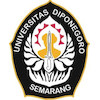
Overview
Established in 1957, the Universitas Diponegoro (Diponegoro University) is a non-profit public higher education institution located in the rural setting of the metropolis of Semarang (population range of 1,000,000-5,000,000 inhabitants), Central Java. This institution also has a branch campus in Jepara. Officially recognized by the Kementerian Pendidikan, Kebudayaan, Riset, dan Teknologi, Republik Indonesia (Ministry of Education, Culture, Research and Technology, Republic of Indonesia), Universitas Diponegoro (Undip) is a very large-sized (uniRank enrollment range: 35,000-39,999 students) coeducational Indonesian higher education institution. Universitas Diponegoro (Undip) offers courses and programs leading to officially recognized higher education degrees such as pre-bachelor's degrees (i.e. certificates, diplomas, associate or foundation), bachelor's degrees, master's degrees and doctorate degrees in several areas of study. See the uniRank degree levels and areas of study table below for further details. This 66-year-old Indonesian higher-education institution has a selective admission policy based on entrance examinations and students' past academic records and grades. The acceptance rate range is 0-9% making this Indonesian higher education organization an extremely selective institution. International applicants are eligible to apply for enrollment. Undip also provides several academic and non-academic facilities and services to students including a library, housing, sports facilities, financial aids and/or scholarships, study abroad and exchange programs, as well as administrative services.
University Snapshot
Control
![]() public
public
Entity
![]() non-profit
non-profit
Size
![]() very large-sized
very large-sized
Selectivity
![]() extremely selective
extremely selective
University Identity
| Name | Universitas Diponegoro |
|---|---|
| Name (English) | Diponegoro University |
| Acronym | Undip |
| Founded | 1957 |
| Motto | Wiyata Hangreksa Gapuraning Nagara Safeguarding the dignity of the nation |
| Colours | Blue |
| Mascot | Prince Diponegoro |
| Screenshot |

|
| Video Presentation |
University Location
| Address | Jalan Prof H Soedarto, SH Kampus Tembalang Semarang 50275 Central Java Indonesia |
|---|---|
| Location Map and Satellite View | |
| +62 (24) 746 0011 | |
| +62 (24) 746 0013 | |
| Other locations | Jepara |





Social Media
Introduction
Social media can be a powerful tool for Universities to communicate with current students, alumni, faculty, staff and the wider community. But how can social media be important for prospective students? Read our article about the importance of Social Media for universities and prospective students to learn more.
Social Media
uniRank publishes brief reviews, rankings and metrics of some Universitas Diponegoro's social media channels as a starting point for comparison and an additional selection tool for potential applicants.
Universitas Diponegoro's Facebook page
Universitas Diponegoro's X (formerly Twitter) page
Universitas Diponegoro's YouTube channel
Universitas Diponegoro's Instagram page
Universitas Diponegoro's main LinkedIn profile
n.a.